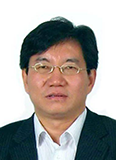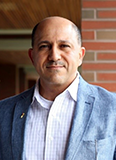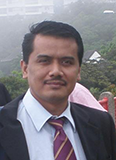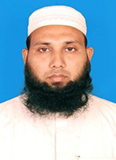

Prof. Fushuan Wen
IEEE Fellow
Zhejiang University, China
Fushuan Wen, an IEEE Fellow, is an expert in power systems and power economics. He has been a professor and doctoral supervisor at Zhejiang University since May 1997 and the first director of the Institute of Electric Power Economy and Information Technology at Zhejiang University since 1999. From 2005 to 2010, he was also a distinguished professor of "Pearl River Scholars" in Guangdong Province, Vice President of the School of Electric Power, South China University of Technology, and the first director of the Institute of Electric Power Economy and Power Market. He is also a professor at the Hainan Research Institute of Zhejiang University and a director researcher at the Shenzhen Institute of Artificial Intelligence and Robotics. He has served as a professor, visiting professor, or visiting researcher at more than 10 overseas universities and research institutions, including the National University of Singapore. More than 200 published papers have been included in SCI, more than 670 in EI, more than 780 in Scopus, and more than 17900 cited papers. Since 2015, he has been selected as a highly cited scholar in China by Elsevier for eight consecutive years. The research results won the National Natural Science Award in 1997. The other seven achievements won the provincial and ministerial science and technology progress awards. He has received special government subsidies from the State Council. He is editor in chief of Energy Conversion and Economics (SPERI, IET), associate editor of Power Systems Automation magazine, and editorial board member or feature editor of more than 10 other magazines.
Speech title: Correlation analysis among electricity price, carbon price and fossil fuel price in market environment
Abstract: The correlations among the electricity market, carbon market, and fossil fuel market have profound impacts on energy transition and carbon reduction. This speech presents theoretical modeling and empirical analysis for examining the correlations. First, a comprehensive power generation cost index is proposed to establish the mathematical relationship among the electricity price, carbon price, and fossil fuel price. Then, data from three kinds of markets in China and Europe from 2019 to 2023 are collected, and empirical analysis methods including the cointegration test, vector error correction model, and impulse response are used to investigate the long-term equilibrium problem and short-term dynamic adjustment relationship among the electricity price, carbon price, and fossil fuel price. Finally, empirical analysis results of China and Europe are compared to demonstrate similarities and differences in energy transition and carbon reduction.

Prof. Hossam Gaber
Ontario Tech University, Canada
Dr. Gabbar is a full Professor in the Department of Energy and Nuclear Engineering, the Faculty of Engineering and Applied Science, at Ontario Tech University (UOIT), where he has established the Energy Safety and Control Lab (ESCL), Smart Energy Systems Lab, and Advanced Plasma Engineering Lab. He is the recipient of the Senior Research Excellence Aware for 2016, UOIT. He is recognized among the top 2% of worldwide scientists with high citation in the area of energy. He is a Fellow IET (FIET) and a Distinguished Lecturer – IEEE NPSS on Nuclear-Renewable Hybrid Energy Systems and Plasma-based Waste-to-Energy. He is leading national and international research in the areas of smart energy grids, energy safety and control systems, and waste-to-energy using advanced plasma technologies. Dr. Gabbar obtained his B.Sc. degree in 1988 with first class of honor from the Faculty of Engineering, Alexandria University (Egypt). In 2001, he obtained his Ph.D. degree from Okayama University (Japan). From 2001 till 2004, he joined Tokyo Institute of Technology (Japan), as a research associate. From 2004 till 2008, he joined Okayama University (Japan) as an Associate Professor, in the Division of Industrial Innovation Sciences. From 2007 till 2008, he was a Visiting Professor at the University of Toronto. He also worked as process control, safety, and automation specialist in energy and oil & gas industries. Dr. Gabbar has more than 270 publications, including patents, books / chapters, journal and conference papers.
Title: Hybrid Energy with Hydrogen Deployment Strategies for the Transition to Zero Carbon Communities
Abstract: In this talk, hybrid energy with hydrogen deployments strategies are analyzed, modeled usign collaborative simulation. The different modeling levels of hybrid energy systems and hydrogen technologies will be presented as interconnected with community infrastructures. Collaborative simulation approaches are used to evaluate the utilization to plan hydrogen deployment in municipalities and community applications. The concept of energy semantic network is utilized to model energy networks and interconnected infrasturctures while defining key performance indicators. The collaborative simulation will enable the definition of different strategies and scenarios and optimize based on performance, risks, and transactive energy. Case studies will be presnted with energy, nuclear, transportation, hydrogen, and water networks as interfaced with infrastructures.

Prof. Ahmad Zuhairi Abdullah
Universiti Sains Malaysia,Malaysia
Professor Dr. Ahmad Zuhairi Abdullah is currently an academic member of the School of Chemical Engineering at Universiti Sains Malaysia. He received his B. Tech (Hons), MSc, and PhD in 1995, 2000, and 2004, respectively. His research works mostly encompass the synthesis of novel functionalized nanoporous materials as ordered catalysts in environmental catalysis, oleochemical reactions, agricultural waste treatments, waste utilization, and the production of renewable energy sources from renewable sources. He is the recipient of several innovation and publication awards based on his research. He has been involved in the dissemination of science and technology through more than 250 refereed publications in journals and book chapters, mainly as the main author, and also as a technical committee member at nearly 150 international scientific conferences held across the globe. He is often invited to share his research experiences at international conferences held in Malaysia, Laos, Indonesia, Vietnam, and China. In addition, he is an evaluator of research proposals received from the university, local ministries, and several international scientific associations in the USA, Oman, Qatar, and Chile. He is regularly appointed by the Department of Environment Malaysia as an expert panel for the evaluation of the Environmental Impact Assessment reports for various proposed projects related to petrochemical complexes, paper mills, metal smelting, chemical plants, lead acid batter recyclers, etc. He is one of the recipients of the Top Research Scientists Malaysia (TRSM) award in 2014 and is listed in the List of the World's Top 2% Scientists by Stanford University. His h-index (Scopus) currently stands at 52 with more than 9,000 citations.
Title: Oleochemical Waste Valorization: Glycerol Conversion to Fuel Additives and Other Value-Added Chemicals Using Heterogeneous Catalytic Processes
Abstract: Glycerol, a simple polyol and a by-product of oleochemical and biodiesel industries, is now overproduced to the extent of being considered waste, driving prices down and causing disposal issues. This surplus underscores the urgent need for green solutions. Glycerol holds significant potential for conversion into high-value products, offering environmental benefits due to its chemical properties and renewability. Novel catalytic processes can transform glycerol into oxygenated biocomponents, sustainable alternatives to petroleum-derived fuel additives. These additives improve octane ratings and combustion quality while reducing particulate emissions and carbon monoxide production, contributing to cleaner air and reduced fossil fuel dependence. Novel catalytic materials with highly active sites and suitable support characteristics are essential for environmentally sustainable oleochemical conversions.
Studies have explored catalytic etherification, acetylation, and acetalation processes to convert glycerol into fuel additives. The success of these green conversions depends on using appropriate catalytic materials with specific properties and optimized conditions. Mesoporosity is crucial as it affects the internal diffusion rate of the high-viscosity liquid reactant and access to active sites, highlighting the importance of catalyst design for environmental efficiency.
The catalytic etherification of glycerol to polyglycerols is another promising avenue. Polyglycerols are biodegradable and biocompatible, making them suitable for various industries and reducing environmental impact by offering greener alternatives to synthetic chemicals. Additionally, glycerol can react with fatty acids to form monoglycerides, widely used in the food and pharmaceutical industries, promoting sustainable industrial practices.
Producing lactic acid through alkali-catalyzed reactions offers potential as a starting point for a range of future biobased chemicals via catalytic routes, supporting the shift towards a bio-based economy. Furthermore, the catalytic deoxydehydration of glycerol to acrylic acid presents significant opportunities due to the high demand for acrylic acid in manufacturing polymeric products, making them more environmentally friendly.
The main challenge is developing stable catalysts with high activity and selectivity for the desired compounds. Current research focuses on novel catalysts to improve conversions and yield the desired products while minimizing environmental impact. A heterogeneous reaction system is critical to enhancing the green aspects of these processes, contributing to sustainability by reducing waste and improving efficiency.
Glycerol exemplifies the potential of green technology to create more sustainable oleochemical industries, especially in major vegetable oil-producing countries like Malaysia. The development of novel heterogeneous catalysts with desired characteristics is pivotal to this success, driving a more sustainable and environmentally friendly industrial future.

Assoc. Prof. Jiashen Teh
Universiti Sains Malaysia, Malaysia
Dr. Teh graduated with a PhD in Electrical Engineering from the University of Manchester, UK, in 2016 and is currently an Associate Professor at Universiti Sains Malaysia (USM). He is also a technical director at UPE-Power in Taiwan. He mainly explores the benefits of using flexible transmission power line ratings to enhance grid reliability. To date, he has published more than 60 journal articles in the SCIE database, with most of them ranked in the top two quarters of the ranking, garnering more than 2900 citations and a 31 h-index on Google Scholar. He was the top 2% of the world's most-cited researchers by field in 2019, 2020, and 2021, according to Stanford University. In 2021 and 2022, he received the Outstanding Engineer Award from the IEEE Power & Energy Malaysia and the IET Malaysia Outstanding Young Professional Award, respectively.
Title: Dynamic Line Rating (DLR) for Enhanced Grid Reliability
Abstract: In this keynote speech, dynamic thermal line rating (DTLR) emerges as a transformative solution in modernizing power grid management. Highlighting its significance in enhancing grid resilience and efficiency, the speaker delves into the principles and applications of DTLR technology. Through real-world case studies and innovative approaches, attendees gain insights into how DTLR dynamically optimizes transmission line capacities based on environmental conditions, mitigating congestion risks and enabling higher utilization rates. Furthermore, the speech explores the integration of DTLR into smart grid frameworks, paving the way for a more adaptive and sustainable energy infrastructure.

Assoc. Prof. Md Hasanuzzaman
Universiti Malaya, Malaysia
Dr. Md. Hasanuzaman is currently working as an Associate Professor at the Higher Institution Centre of Excellence (HICoE), UM Power Energy Dedicated Advanced Centre (UMPEDAC), University of Malaya, Malaysia. He was listed among the world's top 2% of scientists for the years 2023, 2022, 2021, and 2020. He was Program Coordinator (Master of Renewable Energy, September 2012 to September 2020), Double Degree Program with Master of Energy Science, Kyoto University, Japan. He is an Associate Editor of the Alexandria Engineering Journal, Elsevier; Associate Editor in Chief of the International Journal of Renewable Energy Resources; and has been a Guest Editor for Renewable Energy, Elsevier. His two books, Technologies for Solar Thermal Energy, 2022, and Energy for Sustainable Development, 2020, published by Elsevier, His research interests include thermal engineering, renewable energy, energy and buildings, energy policy, transport, and electric vehicles. He has delivered many keynote speeches as a keynote speaker at many international conferences. He has also authored and co-authored more than 140 research papers and 50 conference proceedings. Dr. Hasan has more than 7250 citations with an h-index of 45 in the Scopus index and 10,000 citations with an h-index of 50 in the Google Scholar index. Dr. Hasan has supervised and supervised more than 50 postgraduate students. He has secured and managed more than 7 million Ringgit in national and international research grants as a PI and co-PI. He received a University of Malaya Excellence Award in 2012 for his outstanding achievement in his PhD.
Speech Title: Clean Energy and Low Carbon Technologies Challenges in Energy Sector and Its Future
Abstract:Energy is one of the basic inputs for economic growth, automation, modernization and social development. Current global energy supply mainly come from fossil fuels that emits greenhouse gases. According to IPCC, global warming continues and getting worse if there is not rapid initiative will be taken to shift towards clean energy and decarbonization technologies. About 350 ppm of CO2 in the atmosphere is a safe norm. The current CO2 emission is already more than 400 ppm that is already crossed the safe level and represents a risk state. As the fossil fuels-based energy is the main source of CO2 emission and air pollution, the green energy and decarbonization technologies are the potential solutions.